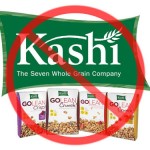Kashi: Representing Misrepresentation
 As reported at mercola.com and USA Today, Kashi has become the poster child of how lax labeling laws can leave consumers believing they’re buying one thing when, in fact, they’re getting something else entirely. Case in point: In Kashi’s “natural” cereals, the soy used is GMO. For most of us, that wouldn’t seem natural at all, but it’s perfectly legal in North America.
As reported at mercola.com and USA Today, Kashi has become the poster child of how lax labeling laws can leave consumers believing they’re buying one thing when, in fact, they’re getting something else entirely. Case in point: In Kashi’s “natural” cereals, the soy used is GMO. For most of us, that wouldn’t seem natural at all, but it’s perfectly legal in North America.
Personally, I find this kind of “gaming the system” to be deceptive. I may not be much of a cereal eater these days, but I certainly have eaten Kashi cereals and their cereal bars. I can promise you that I’m not a happy camper to think that I was consuming GMOs. The problem isn’t so much with Kashi, which is operating within the letter of the law, but with the law itself that enables companies to use wholly unnatural ingredients in products and label them as natural.
I’m definitely not alone, it seems, in my expectation that when a company labels something as natural, it’s not artificial. The law itself defines natural as “food that’s minimally processed, made with no artificial colors, flavors, preservatives or sweeteners.” To me, it seems logical that if you’re going to disallow artificial colours, you’d also disallow genetically modified organisms. Alas, no. What’s logical to me is, in fact, an intentional loophole in the definition.
The rule of thumb is that if you want to be ensured that you’re eating healthful food, you really have no choice but to buy certified organic. Anything else is subject to all manner of tampering and deceptive labeling. In this case, one company’s “natural” turned out to be a whole lot of people’s definition of frankenfood.
Let’s be careful out there.



Leave a Reply